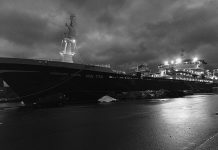By Ndapewoshali Shapwanale, Shinovene Immanuel | 13 April 2018
THE state-owned National Fishing Corporation of Namibia (Fishcor) bought a fish factory at the coast for N$160 million in 2016, amid concerns that the parastatal overpaid by as much as N$50 million for the building.
The Namibian reported this week that fisheries minister Bernhard Esau handed Fishcor a fishing quota worth more than N$1,8 billion over a 15-year period. This deal would also benefit an Angolan-based company which partnered Fishcor.
It has turned out that Fishcor did not only get a sweetheart deal from the fisheries ministry, but the parastatal paid N$50 million more on the fish factory that is old.
The details and background of this transaction are included in documents obtained by The Namibian, while seven people who were either involved or directly briefed on this matter, confirmed the details of this deal.
Most of the people did not want to be named because they fear that the fisheries ministry would cut their fishing quotas in retaliation for their comments.
Etale Fishing, which closed in 2013, laying off about 700 workers, owned the property through its subsidiary, Etale Properties.
The sources said Etale Fishing put the factory up for sale in 2015 for N$110 million, which was the valuation of that property. A source said the factory was valued by another valuer at N$90 million in 2015.
Etale Fishing eventually sold the factory in 2015 to well-connected Walvis Bay businessman Jose Luis Bastos, who was a director of Etale at the time.
The exact price paid by Bastos for the factory is unclear, but two people said it was between N$70 million and N$85 million. Bastos then sold the factory to Fishcor the following year for N$160 million.
Bastos declined to comment on the price he bought the property for from Etale.
“I cannot tell you. I don’t want to be rude to you, but my business is my business. I sold the property two years ago,” he said.
Fishcor never publicly advertised the tender for buying the fish factory, a decision that would have given the state-owned fishing company better options.
Esau’s supporters claim that the minister’s decision to spoon-feed Fishcor with 50 000 metric tonnes of fish every year (around N$120 million) is aimed at empowering Namibians.
Some critics have, however, argued that the Fishcor transaction is favouring a state-owned entity that has a history of failing and forcing the closure of private fishing companies which employ thousands of Namibians.
In fact, the new fish factory ownership will be foreign-dominated since it is managed by a new company called Seaflower Pelagic Processing, a joint venture between Fishcor (40%) and the Angolan-based African Selection Fishing Namibia (60%).
One of Etale Fishing’s former directors told The Namibian this week that the sale of the factory was “very questionable”, and that the state-owned company must explain and account for the transaction.
“They must explain how they ended up being the buyers of that property,” the former owner-director said, adding that fisheries minister Esau should also explain the purchase of the property.
Esau did not want to comment on Fishcor when approached by The Namibian on Wednesday, saying he can only comment after his ministerial budget discussion was completed in parliament.
As it stands, Fishcor’s new partner in Seaflower Pelagic Processing, which is majority-owned by a South African businessman based in Angola, will take up the market left by Etale Fishing and Bidvest Fishing that is expected to close any time soon after reduced quotas.
The former director said the fall of Etale Fishing is a setback to empowerment in Namibia.
“This was the only black-owned processing plant in the country at the time. I cannot even tell you how everything happened. You know when you are standing in the middle of a storm, a real storm, a hailstorm, you don’t know what is going on around you, and the next thing you know is everything is over. This is what happened with Etale,” the ex-director said.
Fishcor demolished the Etale factory, but the former owner said the factory had not reached the end of its useful economic life, as claimed by Fishcor.
Fischor plans to build a N$530 million fish factory, but people familiar with the factory said even this amount appears inflated.
The Namibian understands that several Cabinet ministers are nervous about the Fishcor saga.
A person familiar with this matter said Fishcor board chairperson James Hatuikulipi and the parastatal’s management briefed the board last year, and some board members visited the plant at Walvis Bay.
DENIAL
Fishcor’s chief executive, Mike Nghipunya, told The Namibian last week that the purchase of Etale Properties was a strategic move “as it is the only available piece of land with quay (besides the sea) access”.
He denied suggestions that Fischor had overpaid for the factory.
“As per valuation done in October 2016, the market value of the property was N$171 million. We negotiated down to N$160 million, which I think is remarkable. I don’t agree that we overpaid at all,” he said yesterday.
Nghipunya attached a valuation report by property valuer Ingo Buchert, which said the property was valued at N$171 million in 2016. That evaluation was not done for Fishcor, but for a company called Emiratus Fishing, which also benefits from fishing quotas from the fisheries ministry.
Buchert said in the valuation report that he estimated the value of the property, even though his last inspection of that factory was in May 2014.
It is unclear what influenced the price to shoot up from N$110 million to N$171 million in a space of a year for a property Nghipunya admitted was old and last used in 2012.
“The price of the property was not determined by Fishcor, but by the seller. Whether it was the right price or not, that is not for Fishcor to decide as it was privately owned property,” Nghipunya said. He claimed not to know that the property was offered for N$110 million a year before Fishcor bought it for N$160 million.
Asked how Bastos is being paid, Fishcor’s chief executive said they are paying the businessman through the normal operations of the Seaflower Group of Companies, the entity that owns Fishcor.
“The factory was last used in 2012 for hake processing, and we are going to be processing horse mackerel, which requires a different set-up and machinery,” he said.
He added that they had to demolish the old building since it was not viable to operate.
“The factory has reached its useful economic life,” Nghipunya stated.
He furthermore claimed that the factory complex, which will be the largest onshore pelagic processing factory in sub-Saharan Africa, would employ approximately 700 people.
That is the number of people who were employed by Etale, utilising a smaller factory. The 700 people are 500 people fewer than what Bidvest Fishing employs.
Nghipunya threatened not to answer any more questions on this matter.






